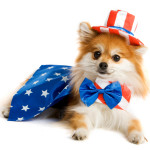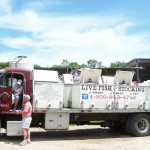 For many people, nothing beats lounging in the backyard on the Fourth of July with good friends and family—including furry friends. While it may seem like a great idea to reward your pet with scraps from the grill and bring him along to watch fireworks, in reality, some festive foods and activities can be potentially hazardous to him. The ASPCA Animal Poison Control Center offers the following tips:
For many people, nothing beats lounging in the backyard on the Fourth of July with good friends and family—including furry friends. While it may seem like a great idea to reward your pet with scraps from the grill and bring him along to watch fireworks, in reality, some festive foods and activities can be potentially hazardous to him. The ASPCA Animal Poison Control Center offers the following tips:
Fourth of July Pet Safety Tips
Never leave alcoholic drinks unattended where pets can reach them. Alcoholic beverages have the potential to poison pets. If ingested, the animal could become very intoxicated and weak, severely depressed or could go into a coma. Death from respiratory failure is also a possibility in severe cases.
Do not apply any sunscreen or insect repellent product to your pet that is not labeled specifically for use on animals. Ingestion of sunscreen products can result in drooling, vomiting, diarrhea, excessive thirst and lethargy. The misuse of insect repellent that contains DEET can lead to neurological problems.
Always keep matches and lighter fluid out of your pets’ reach. Certain types of matches contain chlorates, which could potentially damage blood cells and result in difficulty breathing—or even kidney disease in severe cases. Lighter fluid can be irritating to skin, and if ingested can produce gastrointestinal irritation and central nervous system depression. If lighter fluid is inhaled, aspiration pneumonia and breathing problems could develop.
Keep your pets on their normal diet. Any change, even for one meal, can give your pet severe indigestion and diarrhea. This is particularly true for older animals who have more delicate digestive systems and nutritional requirements. And keep in mind that foods such as onions, chocolate, coffee, avocado, grapes, raisins, salt and yeast dough can all be potentially toxic to companion animals.
Do not put glow jewelry on your pets, or allow them to play with it. While the luminescent substance contained in these products is not highly toxic, excessive drooling and gastrointestinal irritation could still result from ingestions, and intestinal blockage could occur from swallowing large pieces of the plastic containers.
Keep citronella candles, insect coils and tiki torch oil products out of reach. Ingestion can produce stomach irritation and possibly even central nervous system depression. If inhaled, the oils could cause aspiration pneumonia in pets.
Never use fireworks around pets! While exposure to lit fireworks can potentially result in severe burns and/or trauma to the face and paws of curious pets, even unused fireworks can pose a danger. Many types contain potentially toxic substances, including potassium nitrate, arsenic, and other heavy metals.
Loud, crowded fireworks displays are no fun for pets, who can become frightened or disoriented by the sound. Please resist the urge to take them to Independence Day festivities, and opt instead to keep them safe from the noise in a quiet, sheltered and escape-proof area at home.
Be prepared in the event that your pet does escape by keeping your pets’ IDs up to date! It’s a good idea for all your animal companions—even indoor-only pets—to always wear a collar with an ID tag that includes your name, current phone number, and any relevant contact information. July 1 is National ID Your Pet Day, which serves as an annual check-in to make sure your pets’ identification tags and microchip information is up to date.
Content by ASPCA



